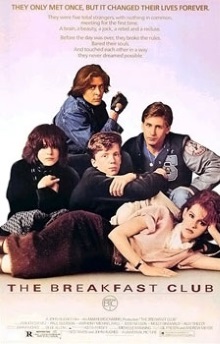
Coming fresh off the heels of a film about youths in Mexico in the 1950s, here’s a film about teenagers in America in the 1980s. Most Malaysians will probably know director John Hughes best for his Home Alone movies of the 1990s but he is more significant for a slew of highly influential films about high-schoolers and their problems a decade earlier. Of these, The Breakfast Club is probably the most highly regarded and caused the young actors who appeared in it to be lumped together as the Brat Pack.
The entirety of this film takes place in the space of a single Saturday. Five students are forced to come to school for a day-long detention. Each of them can be said to represent a different archetype: the nerdy academic overachiever, the sports jock, the popular school princess, the rules-breaking rebel and crazy goth girl. Though they bicker and fight inside the confines of the school library they are trapped in, they close ranks against the assistant principal who has to supervise them. Eventually, and predictably, they bond with each other and become friends.
The Breakfast Club was certainly a financial success. It earned over US$50 million on a budget of only US$1 million. But it’s hard to call it a commercial movie. It’s a dialogue-driven piece that is set almost entirely inside a library. If anything it resembles a stage play. There are a couple of comic scenes and hijinks, such as when they sneak out of the library and have to find a way back before the principal discovers that they are gone or when they get high on marijuana, but it is otherwise remarkably restrained. It really is mostly just a bunch of kids sitting around in a circle to talk about their problems. That it nevertheless managed to do so well means that something in it must have resonated with audiences.
Unfortunately its writing and dialogue aren’t quite sophisticated enough to elevate it into the realm of serious art either. Contemporary critics lauded it as an insightful look into the inner lives of teenagers but for a generation who grew up on Beverly Hills 90210, the revelations here seem banal. Worse, by modern sensibilities, it looks like a bunch of privileged kids gripping over white-people problems. When Ally Sheedy as the goth chick finally reveals that her parents’ failure is to ignore her and Emilio Estevez as the jock nods sagely at her in return, you almost feel embarrassed on their behalf. After you’ve watched The Wire and seen the dire state of the schools depicted there, it’s hard to take Judd Nelson’s version of criminal youth seriously.
I did like how the kids are self-aware enough to realize that the tenuous friendship that they’ve formed over the course of a day is unlikely to last once the school reopens. I also really liked the janitor pointing out to the principal that each generation of high-schoolers are the same as ever but it’s the principal who has become more jaded and cynical as he has grown older. And if the kids come across as being tremendously self-important, isn’t that itself part of the experience of being a teenager in high-school? That’s authenticity of a sort and it’s not hard to see why this appealed to a lot of people.
I do realize that if I’d first seen The Breakfast Club back when I was in high-school myself, I’d have thought that it was amazingly deep and poignant. Now I think it’s just a mildly interesting film that is sadly dated. Still, even I have to confess to feeling a frisson of thrill when I heard the opening bars of its theme song, Don’t You (Forget About Me), by Simple Minds. It’s so 80s and so emblematic of teenagers’ insistence that they won’t grow up and forget each other, though of course we know that they will. So maybe it’s worth watching this movie after all if only for this reminder of we were all like in high-school.
2 thoughts on “The Breakfast Club (1985)”